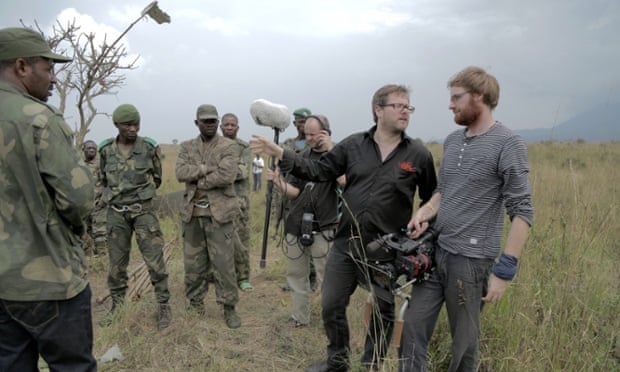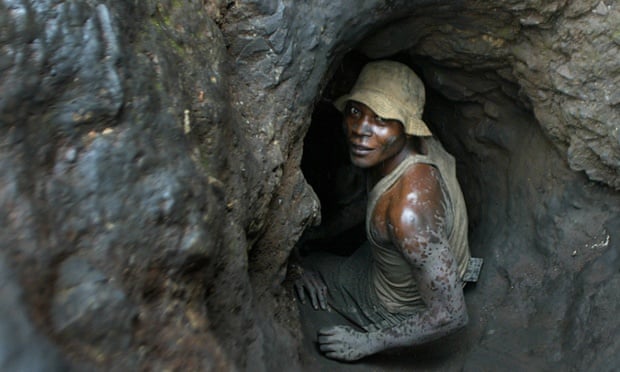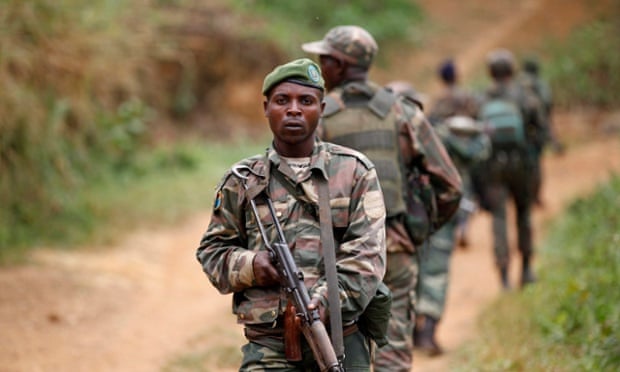Genocide Watch exists to predict, prevent, stop, and punish genocide and other forms of mass murder. Our purpose is to build an international movement to prevent and stop genocide.
Staff Login
DRC Update: conflict and art in investigating wars
Part War Crimes Trial, Part Performance Art: Tribunal Investigates Congo Conflict
Theatre director brings together mining companies, government officials and local residents to try to unravel one of the world’s most complicated wars
David Smith, the Guardian
29 May 2015 (posted on Genocide Watch 01 June 2015)
No one knows exactly how many people have died in the past two decades in the Democratic Republic of the Congo, but Milo Rau, a Swiss theatre director and journalist, puts the figure at six million.
No one is quite sure why conflict has raged either, thanks to the labyrinthine complexity of the region: the alphabet soup of armed groups, the seeming lack of ideology and the shadowy involvement of neighbouring countries and multinational corporations.
But Rau is determined to unravel at least some of these tangled threads. Today he will begin staging an unprecedented event – part political inquiry, part verbatim theatre – in eastern Congo itself, hearing evidence from players on all sides of the ongoing tragedy.
“There are no huge battles, there is no Stalingrad,” he says, explaining why Congo defies the single story that headline writers crave.
“Instead you have massacres – like the one inMutarule in which 35 people died last year – but they happen every day and, after 20 years, you have six million people dead and you don’t even have a trial. Through the tribunal we hope to simplify it and give it a human face.”
Costing 900,000 euros (£643,969), The Congo Tribunal will take place across six days starting today, first in Bukavu, then later in June in Berlin, where in the 19th century the colonialist empires infamously gathered in a “scramble” to carve up Africa.

‘Nothing has changed’
It took a year to put together a “cast”, including Congolese government and opposition politicians, military officers and rebels, UN and World Bank mandarins and major mining companies, as well as ordinary Congolese citizens, philosophers, economists and lawyers who will all appear before an international jury.
Rau, 38, is determined that it will not merely be an exercise in western corporation-bashing, and should differ from the Russell Tribunals on Vietnam andPalestine – organised by Nobel-prize winning philosopher Bertrand Russell, and hosted by Jean-Paul Sartre in the 1960s.

The tribunal – backed by sponsors including the German and Swiss culture ministries – moves to Berlin onfrom 26 to 28 June. Photograph: IIPM/The Congo Tribunal
“It’s not only leftwing people,” he continues, speaking from Bukavu via Skype. “We have an advocate of a huge mining company and an advocate of the government. We also try to see it from the neoliberal side. It’s necessary to have these minerals to produce the computers we’re talking on. But the most important people are the miners and the citizens to tell what has happened.”
Among these is Théophile Gakinz, a pastor from Bukavu. “The resources are badly divided,” he told Rau’s researchers. “A small group of people takes it all. The rest struggles in misery.”
The tribunal will grapple with the region’s ethnic, political and economic dividing lines. It will look at the implications of assimilating former rebels into the Congolese government army, whether the UN and NGOs in the region have become a “peacekeeping industry”, and what impact, if any, American legislation against conflict minerals has had on the ground.
Prince Kihangi, a civil society activist who will be on the jury in Bukavu, said: “The US wants to appear righteous to the rest of the world. Officially they say, hey, we need a law that shows the world that we impose a ban. That we are not involved in this mafia. But because at the same time we need those minerals we must find other ways.
“For us, all these initiatives are fit for nothing. Absolutely worthless. Nothing has changed.”

In part, the tribunal will look at the impact of American legislation against conflict minerals has had on the ground. Photograph: Schalk van Zuydam/AP
The investigations
This weekend the tribunal will first hear evidence about three local cases. One concerns the discovery of cassiterite [tin ore] on a hill in Bisie in 2002 that attracted numerous armed groups as well as the Congolese army, who walked away with most of the profits. Four years later a company acquired an exploration licence for the mine from the government, which led to an open conflict with the miners on the site.
A key question for the tribunal will be: “Does the industrial mining of the raw materials in Bisie contribute to the security and economical development of the region, or are the foreign mining companies the only ones who profit?”
The second case examines what happened when a Canadian company bought a gold mining licence and wanted the local population to be relocated, causing conflict.
“Has Banro profited from the political instability during the war in order to plunder the natural resources of eastern Congo, or are they pioneers of the industrialisation of the region?”
Peter Mugisho, a local activist, says in a promotional video for the tribunal: “After the re-localisation they find themselves in a situation with no access to running water, no access to health services and no access to food. This is a method to exterminate the population.”
The final case concerns a massacre in the village of Mutarule in June last year, resulting in 35 deaths. Although local authorities had repeatedly warned about increasing insecurity in the region, neither the nearby UN peacekeeping mission nor the Congolese army prevented the atrocity.

DRC military personnel patrol against rebel groups near Beni in North Kivu province. Photograph: Stringer/Reuters
“Key question: Is there no end to the insecurity in eastern Congo because too many local and international players are involved in the numerous conflicts and profit from them, or do they in fact prevent something even worse?”
‘It’s up to us to protect ourselves’
The tribunal – backed by sponsors including the German and Swiss culture ministries – moves to Berlin from 26 to 28 June, where it will examine the involvement of the European Union, the World Bank, the international community and multinational corporations.
It will be filmed and turned into a documentary that will go on general release next year after a premiere at the Tata Raphael Stadium in Kinshasa – where heavyweight boxers Muhammad Ali and George Foreman fought the Rumble in the Jungle in 1974.
The project is a natural successor to Rau’s masterpiece Hate Radio, which reconstructs the broadcasting of a Rwandan radio station that combined pop music with propaganda that fuelled the 1994 genocide.
Sylvestre Bisimwa, chief investigator at the Bukavu hearings, says on the video: “People say to themselves: the state doesn’t protect us. It’s up to us to protect ourselves.
“The victims are left with their pain. They carry their burden alone,” he said.
“This tribunal will lead to a totally neutral and independent prosecution, and will form a base to fight exemption from punishment in Congo.”
© 2015 Guardian News and Media Limited or its affiliated companies. All rights reserved.























































